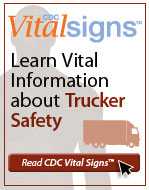LONG-HAUL TRUCK DRIVERS
Health
The National Survey of Long-haul Truck Driver Health and Injury provides important new insights into the relationship between long-haul truck drivers’ work environment and a greater likelihood for health problems. Key findings were:
Seven in ten long-haul truck drivers were obese (BMI of 30 or higher) – twice the number of U.S. adult workers that were obese.*
Obesity increases the chance for these health problems:






*Body Mass Index (BMI) is a number calculated from a person’s weight and height.
More than half of long-haul truck drivers were current cigarette smokers – over twice the number of current cigarette smokers among U.S. adult workers.
Smoking increases the chance for these health problems:




Long-haul truck drivers were twice as likely as other workers to report they were told they had diabetes.
Diabetes raises the risk for these serious health complications:





More than half of long-haul truck drivers reported having two or more of these health conditions or unhealthy behaviors:
These factors increase the chance of developing preventable, long-lasting diseases:






If a health problem affects a driver’s ability to control and drive a commercial motor vehicle safely, he or she may not qualify for a commercial driver’s license (CDL).
For more information about medical requirements for drivers, visit Driver Medical Fitness for Duty from the Federal Motor Carrier Safety Administration (FMCSA).
Visit NIOSH Resources for materials (i.e., brochures, fact sheets, web pages) that address these health problems. See Other Resources for more information on practices and programs to improve truck driver health.
NIOSH is still analyzing data collected in the survey to understand the effects of work environment on health.
- Page last reviewed: February 25, 2015
- Page last updated: February 26, 2015
- Content source:
- National Institute for Occupational Safety and Health Division of Surveillance, Hazard Evaluations and Field Studies



 ShareCompartir
ShareCompartir